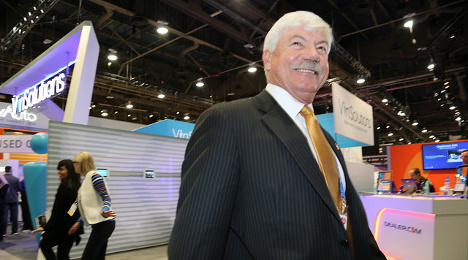NADA chairman: Parts are the only question in the recall process

Current NADA chairman Jeff Carlson at this year's Convention & Expo in Las Vegas. (Photo from NADA)
By subscribing, you agree to receive communications from Auto Remarketing and our partners in accordance with our Privacy Policy. We may share your information with select partners and sponsors who may contact you about their products and services. You may unsubscribe at any time.
TYSONS, Va. –
Parts, parts, parts.
Much has been said and written recently about our nation’s vehicle recall policy. And while it’s regrettable that a great deal of the conversation has been overly negative, needlessly controversial and — at times — unfairly accusatory, the silver lining is that the discussion has prompted an increase in consumer awareness of the issue, which we all know from experience is desperately needed to increase the recall completion rate.
But at the same time, many have lost sight of the core issue at hand, which is what to do with recalled vehicles while consumers and dealers are awaiting replacement parts from the manufacturers. Because when we're talking about recalls, parts are everything.
Let's take a step back and consider what the world would look like if all needed repair parts were immediately and readily available for every vehicle recall.
If parts were available, then everyone — dealers, manufacturers, regulatory agencies like the National Highway Traffic Safety Administration (NHTSA) and the United States Department of Transportation (DOT), and safety advocates — would be in lockstep in stressing the urgency of having consumers bring their vehicles into local dealerships for repairs as soon as possible. Everyone would be working together to improve consumer outreach and awareness, because consumer apathy would be the only obstacle in the way of achieving our shared goal of a 100-percent recall completion rate.
Unfortunately, that's not the world in which we live. Parts are not always available. And manufacturer delays in providing repair parts have become the core problem in recall policy.
Subscribe to Auto Remarketing to stay informed and stay ahead.
By subscribing, you agree to receive communications from Auto Remarketing and our partners in accordance with our Privacy Policy. We may share your information with select partners and sponsors who may contact you about their products and services. You may unsubscribe at any time.
These delays prevent timely repairs of the vehicles. And delays between the time a manufacturer announces a recall and when parts are available are responsible for driving consumer apathy toward recalls. Consumers simply become numb to all the notices they receive.
But the biggest consequence is that manufacturer delays force us all — dealers, regulators, safety advocates and consumers alike — to consider what to do with recalled vehicles from the time the recall is announced to when the repair can be completed.
Which leads to the question every consumer wants answered: Should I continue to drive my recalled vehicle in the interim?
This is a vitally important question. Fortunately, there are federal agencies responsible for providing those answers: DOT and NHTSA.
Congress has entrusted NHTSA, a division of DOT, with reviewing all manufacturer-identified defects in order to determine how severe each is in terms of risk to the driving public. And for every vehicle recall that is issued, NHTSA — working with the vehicle manufacturer — makes such an assessment.
—Does NHTSA have full authority to determine which defects pose such an immediate and severe risk to drivers and passengers that affected vehicles should be parked and not operated until repairs can be made? Yes. Transportation Secretary Anthony Foxx has acknowledged in writing that NHTSA “may require a manufacturer to advise owners not to drive their vehicles until a safety-related defect or noncompliance is remedied.”
—Has NHTSA exercised this authority? Yes. In fact, a recent study revealed that such “do not drive” recommendations were issued in 6 percent of all vehicle recalled issued from 2000 to 2013.
—Were NHTSA and DOT ever asked specifically whether consumers with recalled Takata airbag inflators or faulty GM ignition switches should stop driving these vehicles until repairs could be made? Yes.
—Did NHTSA or DOT issue “do not drive” recommendations for these affected vehicles? No. In fact, NHTSA explicitly told Congress that it did not believe such action was necessary for vehicles with recalled Takata airbags. The DOT said the same thing regarding GM ignition-switch recalls — that it was “not necessary” for consumers to stop driving affected vehicles if drivers took certain precautions.
While everyone may not agree with the answers to some of these questions, DOT and NHTSA thoroughly considered these questions and made these calls. Their decisions shouldn't lead us to play politics with this issue, and we shouldn't react by accusing one another of being anti-consumer or anti-safety.
Because the truth of the matter is that we all want to get 100 percent of recalls fixed 100 percent of the time, period. How do we get there? More parts, and more consumer awareness. And we all have to work together to get there. Our customers deserve nothing less.
Jeff Carlson is the current chairman of the National Automobile Dealers Association.


